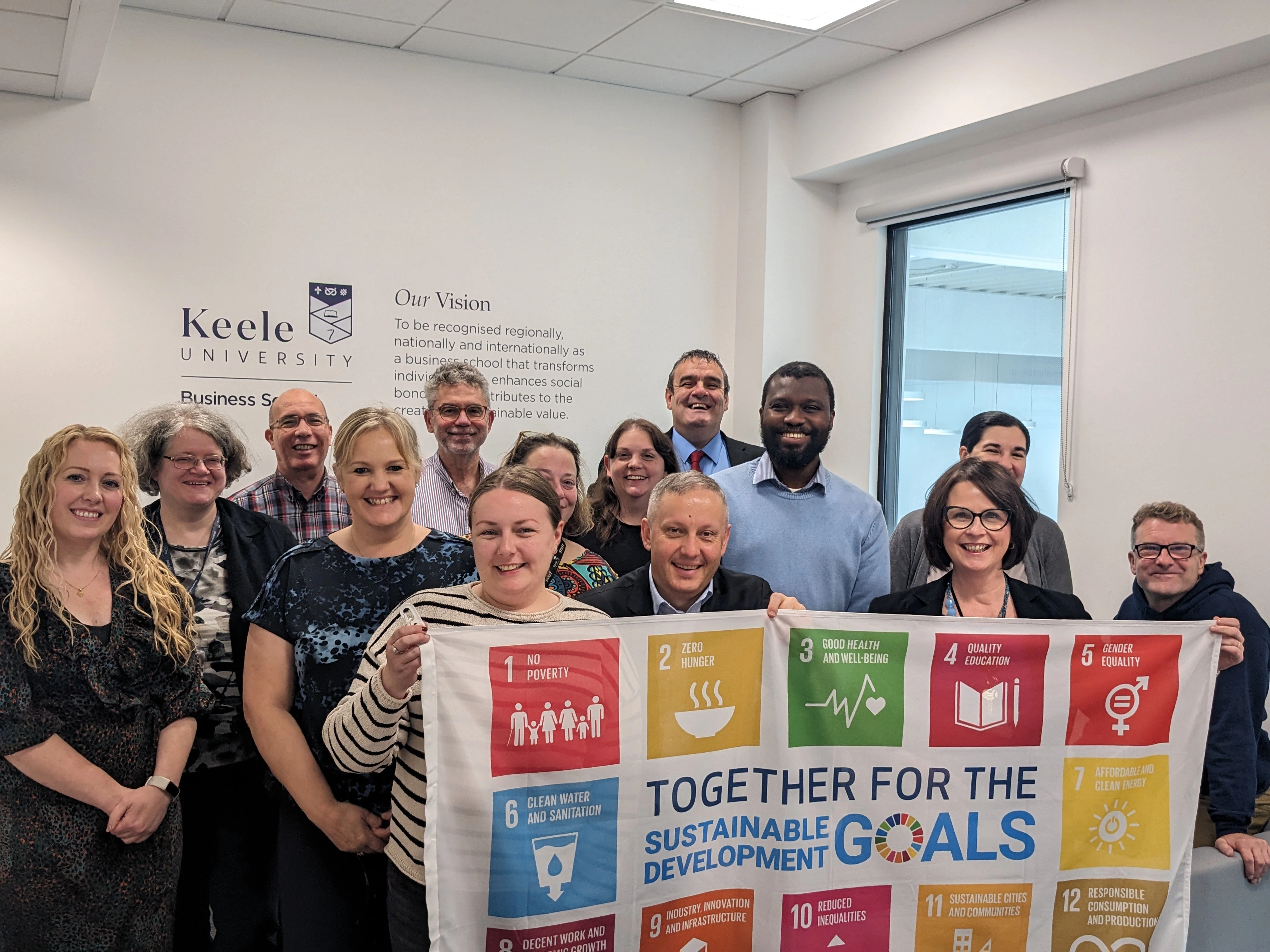Access

- Submit your institution’s Sharing Information on Progress (SIP) Report
- Access SIP reporting across institutions
Access

Access


Keele Business School (KBS) is a forward-thinking PRME Signatory institution recognised for its excellence in business education, research, and innovation. KBS provides a dynamic and inclusive learning environment that blends academic rigour with real-world relevance - equipping students to become future leaders that meet the demands of an ever-changing society, economy and world.
KBS is distinguished by its strong emphasis on interdisciplinary learning, enterprise, and sustainability. The School is committed to responsible management, aligning its mission with global initiatives such as the United Nations Sustainable Development Goals (SDGs).
The School has recently undertaken a validation of all of its programmes, ensuring the curriculum meets the demands of future employers, students and wider society, whilst also ensuring that sustainability and employability skills are fully embedded within each programme. For the 2025-2026 academic year, these programmes will positively impact over 1,000 students.
Through its four interdisciplinary Research Clusters, which closely align with the SDGs, and collaborative projects, KBS contributes to solving complex societal and economic issues, influencing policy and practice locally, nationally, and globally.
KBS has published a School Sustainability Strategy outlining ambitious goals to drive sustainability and RME across the School and beyond. Key actions include delivering carbon literacy training for staff and students, and enhancing sustainability-focused curriculum development - supported by initiatives such as the SDG Passport for students. The School has also developed a Societal Impact Plan, detailing activities and measures that create sustainable value and promote responsible management.
Students are central to KBS’s sustainability mission. The Staff-Student Sustainability Group empowers student-led projects, while colleagues contribute to initiatives like Global Goals Week, embedding the SDGs into their teaching.
With sustainability embedded across the KBS curriculum, through dedicated initiatives, student-led activities, and business engagement projects such as consultancy work on sustainability themes, KBS has seen a notable rise in student placements and graduate employment within companies with strong sustainability credentials.
Two recent examples highlight the impact of KBS students and alumni:
1) KBS PhD student, Nadeesha Polwaththage, represented KBS at the prestigious United Nations Business & Human Rights Forum in Geneva, joining both academics and industry professionals, to discuss topics amongst the following: Responsible Business Conduct; Global Supply Chain Transparency; Role of Governments and Regulation and the AI Technology and its Impact on Human Rights.
2) KBS (former undergraduate) PhD student, Elliott Lancaster, received his MBE at Windsor Castle in April 2024, for services to Youth Empowerment and Sustainability in Staffordshire. Elliott, who founded Utter Rubbish Ltd and International Chemical Weapons Unit, a global organization promoting sustainable mechanisms to enact a more peaceful and equitable world. He is also an Ambassador for GEN UK, was invited to speak at the COP28 Bridge the Gap Summit, providing a student voice on wellbeing.
Through the School’s PRME Champion Project, Linking Education for Sustainable Development Competencies with Employability, and growing international partnerships, alongside other successes such as Top 40 Corporate Knights Ranking, KBS is increasing its global impact as a business school for advancing responsible management education.
All KBS students have the opportunity to engage with the School-developed SDG Passport, a flexible initiative that complements discipline-specific content on sustainability and the UN Sustainable Development Goals (SDGs). The SDG Passport draws on the ambitions of the UN’s SDGs and links to Principles of PRME:
Values: The SDG Passport facilitates student understanding of the interconnected nature of business school curricula and sustainability, encouraging students to showcase connections between economic sustainability and social and environmental sustainability.
Teach: While we promote students’ recording of relevant extracurricular activities within the SDG Passport, evidencing connections between module content and the SDGs/sustainability is also a key method of engaging with the initiative. With this in mind, the integration of RME concepts and practices into our curriculum and pedagogy is an essential activity to provide students with materials on which they might draw for the SDG Passport.
The SDG Passport showcases the School’s integration of SDGs within the curriculum via module mapping, seeks to explore and increase student understanding and confidence with the SDGs, and to facilitate the creation of a resource which graduates may use as a basis from which to demonstrate their knowledge of, and interactions with sustainability, to potential future employers.
Are you a PRME Signatory Member? Showcase your institution’s impactful work in responsible management education by submitting a Spotlight for a chance to be featured on the PRME website and social media channels.